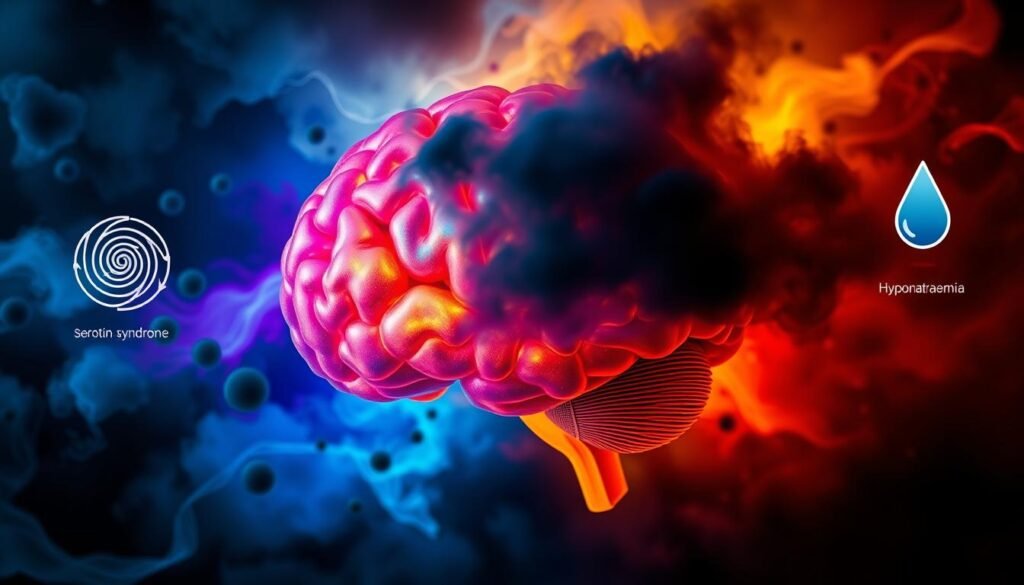Did you know that nearly 40% of people on antidepressants report side effects? This fact shows how crucial it is to understand the risks of these drugs. Antidepressants can greatly improve life for those with depression. Yet, they have side effects that might affect daily life and well-being.
It’s key to be aware of these side effects of depression medications. They can differ based on age, medication type, and other health issues. Seeing your healthcare provider regularly helps monitor and adjust treatment as needed.
Key Takeaways
- Antidepressants may cause a variety of side effects, impacting different individuals in unique ways.
- Common side effects include nausea, weight gain, and trouble sleeping.
- Regular consultations with healthcare providers are crucial for effective management of side effects.
- Understanding the risks and addressing them proactively can enhance treatment outcomes.
- Withdrawal symptoms and discontinuation syndrome highlight the need for proper medical guidance when changing or stopping medication.
Understanding Antidepressants and Their Role in Treatment
Antidepressants are key in treating depression. They help people with clinical depression or major depressive disorder (MDD). These drugs adjust neurotransmitters in the brain, important for mood. Different types of medications work in various ways based on their makeup and the neurotransmitters they affect.
Older antidepressants, like tricyclic antidepressants (TCAs), are used when newer ones don’t work as well. Newer drugs, like selective serotonin reuptake inhibitors (SSRIs) and serotonin-norepinephrine reuptake inhibitors (SNRIs), are preferred for their fewer side effects and greater effectiveness.
Studies show that antidepressants help. About 30% of people using a placebo get better after six to eight weeks. But around 50% improve with antidepressants in the same time. This shows how these drugs can help manage mood disorders.
However, more than half of those taking antidepressants face side effects. These might happen in the early weeks and can range from mild, like nausea and dizziness, to serious, like weight gain and sexual dysfunction.
When starting antidepressants, it’s important to have patience. It often takes weeks to notice any change, with full effects developing over months. Being informed about the different kinds and their effects can make treating depression more effective.
| Class of Antidepressant | Example Medications | Main Target Neurotransmitters |
|---|---|---|
| SSRIs | Prozac, Zoloft | Serotonin |
| SNRIs | Cymbalta, Effexor | Serotonin, Norepinephrine |
| Atypical Antidepressants | Wellbutrin, Remeron | Diverse Neurotransmitters |
| TCAs | Amitriptyline, Nortriptyline | Serotonin, Norepinephrine |
| MAOIs | Phenelzine, Tranylcypromine | Monoamine Neurotransmitters |
Common Side Effects of Depression Medications
People taking antidepressants might experience various antidepressant side effects. These can be mild or more serious, but usually get better as the body gets used to the drug. Often, people report side effects like:
- Nausea and digestive upset are frequently noted, particularly when starting treatment.
- Weight gain may occur, particularly if symptoms improve and appetite increases.
- Fatigue and drowsiness are prevalent, especially during the early weeks of treatment.
- Insomnia can arise as a counterintuitive effect, impacting sleep quality.
- Dry mouth is a common complaint among those taking antidepressants.
- Constipation can happen, particularly with tricyclic antidepressants, disrupting normal digestive functions.
- Dizziness, especially with tricyclics and MAOIs, can be a concern due to their effect on blood pressure.
- Agitation, restlessness, and increased anxiety can result from stimulating antidepressants.
- Sexual dysfunction, such as reduced libido or challenges with orgasm, often affects those on SSRIs.
Sometimes, medication adverse reactions may need a new treatment approach. Doctors often focus on the long-term benefits of these drugs, stating the side effects often get better with time. It’s crucial for patients to discuss any side effects with their healthcare providers, as this can lead to changes in their treatment plan.
To get more understanding of how to handle these side effects of antidepressants, including checking your health and dealing with specific issues, check out this informative resource.

Side Effects of Depression Medications: SSRIs and SNRIs
Antidepressants are very important in treating depression. SSRIs and SNRIs are often chosen because they are effective and have fewer side effects than older medications. Knowing the side effects of these drugs is vital for both patients and doctors.
Typical Side Effects
SSRIs might cause side effects such as:
- Dizziness
- Nausea and vomiting
- Dry mouth
- Headaches
- Weight changes
- Worsening anxiety
- Difficulty sleeping
- Sexual dysfunction, affecting up to 75% of patients
SNRIs can lead to:
- Excessive sweating
- Fatigue
- Constipation
- Loss of appetite
- Potential increases in blood pressure
- Liver problems
It’s important to know these side effects so you can get the right help and make changes with your doctor if needed.
How to Manage Common Side Effects
Dealing with side effects properly can make treatment better. Here are some ways to cope:
- Taking medications at bedtime to reduce issues with insomnia and dizziness
- Eating small, frequent meals can help alleviate nausea
- Maintaining open communication with healthcare providers to adjust dosages or switch medications as needed
- Engaging in regular physical activity to improve overall mood and reduce anxiety
- Ensuring a balanced diet to address weight changes
Following these tips can greatly help in managing side effects. Work closely with healthcare providers to find the best solution for you.
Understanding Tricyclic Antidepressants (TCAs)
Tricyclic antidepressants, known as TCAs, were some of the first to help with depression. They include medications like amitriptyline, desipramine, and doxepin. These drugs work on brain chemicals like serotonin and norepinephrine to reduce depression symptoms. However, they can also cause some tough side effects.
Common Side Effects Associated with TCAs
People taking tricyclic antidepressants might face several side effects. These often include drowsiness, blurred vision, dry mouth, constipation, and lightheadedness due to a drop in blood pressure.
- Drowsiness
- Blurred vision
- Dry mouth
- Constipation
- Lightheadedness due to a drop in blood pressure
Some of these medications can also lead to weight gain or sexual problems. This makes it vital for patients to talk openly with their doctors about what they’re going through.
Long-Term Considerations with TCAs
Using TCAs for a long time requires close watch. Over time, they might cause confusion, heart issues, or seizures. They can also raise the chance of getting diabetes from weight gain. If someone stops taking them suddenly, they might face withdrawal-like symptoms. This shows why it’s key to slowly reduce the dose under a doctor’s guidance.

| TCA | Common Use | Notable Side Effects |
|---|---|---|
| Amitriptyline | Depression, Migraine Prophylaxis | Weight gain, Drowsiness |
| Doxepin | Depression, Insomnia | Dry mouth, Blurred vision |
| Imipramine | Depression, Nocturnal Enuresis | Constipation, Lightheadedness |
It’s important for anyone experiencing side effects to talk with their healthcare team. This way, they can adjust the treatment as needed for the best results.
Potential Health Risks and Severe Side Effects
It’s important to know about the risks when taking antidepressants. These medicines help many, but it’s good to be aware of serious side effects. Problems like serotonin syndrome and hyponatraemia can cause big health issues.
Serotonin Syndrome: Recognition and Action
Serotonin syndrome is serious and happens when there’s too much serotonin in the body. Signs include:
- Agitation and confusion
- Muscle twitches and spasms
- Rapid heart rate
- High blood pressure
- Shivering and sweating
If you see these signs, get medical help right away. It could stop the worst effects of the medication. People on SSRIs or SNRIs need to watch out for these symptoms. Learn more about it at this resource.
Hyponatraemia: Risks for the Elderly
Hyponatraemia is especially risky for older people on SSRIs. Not having enough sodium in your blood can lead to:
- Confusion
- Severe headaches
- Loss of energy
- Seizures
- Coma in extreme cases
Doctors keep a close eye on sodium levels in those at risk of hyponatraemia. Knowing these risks helps keep treatment safe and healthy.

| Condition | Symptoms | Risk Factors |
|---|---|---|
| Serotonin Syndrome | Agitation, muscle twitches, rapid heart rate | Use of SSRIs/SNRIs with other serotonergic medications |
| Hyponatraemia | Confusion, severe headaches, low energy | Age over 65, use of SSRIs, fluid imbalances |
Antidepressant Withdrawal Symptoms and Risks
When you decide to stop taking antidepressants, you might face several withdrawal symptoms. It’s crucial to know what these symptoms are and the risks they carry. This knowledge can make the process of safely reducing medication much smoother.
Signs of Discontinuation Syndrome
Stopping antidepressants suddenly can lead to discontinuation syndrome. This is common with drugs like SSRIs and SNRIs. The symptoms you might see include:
- Flu-like symptoms
- Fatigue
- Heart racing
- Vivid dreams
- Nausea
- Mood changes
- Brain zaps
These withdrawal symptoms usually start two to four days after stopping the drug. They can last from a week to two weeks. In some cases, they go on for up to a year. How bad they get depends on the drug, how long you’ve used it, and your own body.
How to Safely Transition Off Antidepressants
Moving off antidepressants should be done carefully. You should work with your doctor to plan it. A good plan often takes six to eight weeks. This slow reduction helps your body adjust and lowers the risk of discontinuation syndrome.
Here are some strategies for a smooth transition:
- Make a tapering plan with your doctor.
- Talk openly about any withdrawal symptoms you’re feeling.
- Live a healthy lifestyle to help your overall health.
- Watch your symptoms to tell the difference between withdrawal and depression coming back.
Taking charge of your antidepressant withdrawal can help keep your mental health stable during this change.
| Antidepressant | Likelihood of Withdrawal Symptoms |
|---|---|
| Paroxetine | High |
| Venlafaxine | High |
| Desvenlafaxine | High |
| Fluvoxamine | Moderate |
| Fluoxetine | Low |
| Levomilnacipran | Low |
| Milnacipran | Low |
Drug Interactions and Medication Precautions
It’s vital to know how drug interactions antidepressants work if you’re being treated for depression. Some medicines can negatively affect antidepressants. This can make side effects worse or lower their effectiveness. It’s key to keep track of all medicines you’re taking.
Understanding Drug Interactions
Interactions can happen with both kinds of drugs you get from a doctor and those you buy without a prescription. For example, mixing some antidepressants with herbs like St. John’s wort might cause too much serotonin to build up. This can be very dangerous, creating a condition called serotonin syndrome. Knowing the dangers shows how important it is to be careful with all medicines.
Importance of Medication Counseling
Getting good advice on medications is a big part of treating depression effectively. Doctors need to know about all the medicines a person is taking. Talking about all your medicines can help avoid bad reactions. This careful checking makes treatment safer and works better. For tips on treating depression well, you can look at this resource.
Weight Changes and Their Implications
Many people taking antidepressants see changes in their weight. This can be weight gain or weight loss. Over 10% of Americans use these medications for depression. These changes might happen with or without medication.
Weight Gain vs. Weight Loss: What to Monitor
Different antidepressants affect weight differently. SSRIs like paroxetine (Paxil) and mirtazapine (Remeron) often lead to weight gain. Bupropion (Wellbutrin) is less likely to cause weight gain and may help with weight loss. Tricyclic antidepressants such as amitriptyline and nortriptyline are also linked to increased weight.
| Medication Class | Example Medications | Weight Change Potential |
|---|---|---|
| SSRIs | Paroxetine (Paxil) | Increased weight gain likelihood |
| Atypical Antidepressants | Mirtazapine (Remeron) | Commonly causes weight gain |
| Other Antidepressants | Bupropion (Wellbutrin) | Weight loss potential |
| Tricyclic Antidepressants | Amitriptyline, Nortriptyline | Increased weight gain likelihood |
Managing Weight While on Antidepressants
To manage weight on antidepressants, regular monitoring is key. Talk about weight changes with your doctor. Choose healthy foods and stay active. Ensure you get enough sleep and manage stress well.
Also, check for other factors that might affect weight, like hormones or stomach issues. If weight gain is a big issue, switching medications might help.
Recognizing Serious Side Effects
Antidepressants help many with depression, but they can have serious side effects. It’s key to know these risks, especially for those under 25. This age group may have a higher chance of suicidal thoughts early in treatment.
Suicidal Thoughts and Increased Risk
The FDA warns about the risk of suicide in young people taking antidepressants. The risk calls for extra caution at the start of treatment. Loved ones and medical teams should watch for any warning signs. They should offer support and take any concerning thoughts seriously.
Emotional Blunting: Understanding Your Feelings
Emotional blunting is another significant side effect. This means some may feel numb or detached from their emotions. This can rob them of feeling happiness or sadness, worsening their quality of life. Talking to doctors about these feelings is crucial. It helps them find better treatment options or adjust the dose.
Best Practices for Taking Antidepressants Safely
Successfully managing antidepressant treatment means focusing on safety and effectiveness. It’s vital to regularly check in with your health provider. These check-ins are key for adjusting medication and discussing side effects and mental health concerns.
Regular Check-Ins with Healthcare Providers
It’s crucial to have regular appointments with your healthcare provider to ensure your medication is working correctly. These visits let doctors fine-tune treatment based on your feedback. They offer a supportive space to talk about your treatment and any issues you’re facing. Visits should be more frequent at the start of treatment to manage possible side effects better.
Keeping a Medication Log
Keeping track of your medication, side effects, and mood changes is smart. This log is a great help during check-ins with your health provider. It boosts communication and lets you play an active part in your treatment. Documenting your experiences helps identify patterns, making it easier to discuss any needed changes at your visits.
Understanding the importance of following your medication schedule is key. Antidepressants take about 4 to 8 weeks to start working. A consistent schedule ensures better results. Not everyone gets side effects, but talk to your provider if you’re thinking of changing your medication.
Remember, effective treatment often includes therapy and lifestyle changes, not just medication. Talking comprehensively with your health provider can make your treatment even more effective.
In summary, keeping a medication log and regular check-ins with healthcare providers can greatly enhance treatment experiences. This approach promotes mental health and support. For more on making the most of your antidepressant, check out this resource. Learn about different treatment options at this page.
Conclusion
It’s key to know the overview of antidepressant side effects for effective depression treatment. Many patients feel side effects, from mild to severe. This shows why handling these reactions well matters.
Research found that 86% of patients had side effects with SSRI after weeks. Also, 55% thought these effects were hard to handle. This highlights the need for good talks between doctors and patients.
Mental health stigma can make talking about side effects tough. This may lead people to stop their treatment. A study found 53% stopped taking their antidepressant within six months, often due to side effects.
Finding ways to cope and getting help can make the treatment better. This lets patients focus more on getting better.
To wrap up, dealing with depression treatment as a team is crucial. Understanding possible side effects is key. Interested people can learn more from this article on depression myths. Open talks and support help patients handle their treatment better.